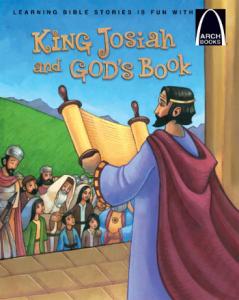I was trying to write something about the story of Josiah in 2 Kings 22, and how this story functions as a kind of creation myth for white evangelicalism.
Josiah was the young king of Judah who, 2 Kings says, “did what was right in the sight of the Lord.” He decided to rebuild the Temple in Jerusalem, which had apparently fallen into disrepair, and during the construction, a priest found the books of Moses in the Temple — the holy scriptures which had apparently been lost and unread for generations. Josiah, according to the way we always recited this story, couldn’t get enough of this newly discovered Bible and so God blessed him.
 That, at least, is how I remembered the story from Sunday school, where it was told and retold at least once a year. Josiah’s story is popular in Sunday school partly because he first became king when he was 8 years old, and kids like hearing about a king who was their age.
That, at least, is how I remembered the story from Sunday school, where it was told and retold at least once a year. Josiah’s story is popular in Sunday school partly because he first became king when he was 8 years old, and kids like hearing about a king who was their age.
But the main reason we kept going back to Josiah was because we claimed his story as our story. In our way of thinking, it was all about reading the Bible as the best way of serving God, and that was also what we believed about ourselves. We were just like Josiah. We were the people who had rediscovered the Bible that those other so-called Christians had all forgotten and neglected. We restored it to its true form in the King James Version and had dedicated ourselves and our nation to it, just as Josiah had.
What I hadn’t remembered from all those retellings of this story was what Josiah did next — all the things recorded, apparently approvingly, in 2 Kings 23. “Neither before nor after Josiah was there a king like him who turned to the Lord as he did — with all his heart and with all his soul and with all his strength, in accordance with all the Law of Moses.”
I remembered that bit. And how Josiah went throughout the land tearing down idols and the altars of rival gods, cleansing his kingdom of “all the articles made for Baal and Asherah and all the starry hosts.”
But our Sunday school versions of the story of Josiah had skipped past some of the more vivid details of Josiah’s zealous plans for reform:
Moreover, Josiah removed all the shrines of the high places that were in the towns of Samaria, which kings of Israel had made, provoking the Lord to anger; he did to them just as he had done at Bethel. He slaughtered on the altars all the priests of the high places who were there, and burned human bones on them.
Arch Books left that out of their chipper little rendition of this story, King Josiah and God’s Book. The toppling of the idols and of the idolatrous altars was considered good stuff for a children’s story, but the mass murder of the idolaters and their vengeful human sacrifice (!) wasn’t considered appropriate material even for the adult Sunday school classes.
Nor did we ever get into the stranger aspects of this story. Our version of the story always included the cheery promise made to Josiah at the end of 2 Kings 22. Because of his devotion to the rediscovered scriptures, and because he instituted the commemoration of Passover, God promised Josiah that “you shall be gathered to your grave in peace.”
But we left out the bit where that didn’t happen. The following chapter, 2 Kings 23, ends with Josiah riding out to meet the army of “Pharaoh Neco king of Egypt” and then matter of factly states that “when Pharaoh Neco met him at Megiddo, he killed him.”
Josiah’s “servants carried him dead in a chariot from Megiddo,” and brought him back to Jerusalem to bury him. I suppose in some technical, monkey’s paw sense, that might count as being gathered to his grave in peace. But it’s still unsettling.
And then it gets worse. Josiah’s oldest son becomes king but only serves for three months before Neco takes him captive and begins exacting tribute on Josiah’s conquered kingdom. The Pharaoh then installs Josiah’s younger son as a puppet king, a tool of Egypt.
The ending to this story is poetically horrifying. The righteous king Josiah devotes himself to God more than any other king of his people. And then the only king of Israel or Judah ever to keep Passover is killed by Pharaoh, who then makes Josiah’s son a captive in Egypt.
I don’t know what to make of that. The cruel irony of that is almost as difficult to contend with as the text-of-terror aspects of Josiah’s gleeful slaughter of the idolatrous priests.
To me, stories like this are a reminder that our Bible is an ancient book. If the past is a different country, then the ancient world is a different planet. The ancient stories of our Bible can be inscrutable, impenetrable, and bewildering. An important part of our task as modern readers, then, is to admit and accept that we are bewildered.
We don’t like to do that. We like to pretend that the Bible is as simple, tidy, “perspicuous,” and self-evidently clear in its meaning as our own Arch Books adaptations of it. It becomes merely a collection of stories like that children’s-book version of the story of Josiah — an anthology of facile fables with simple “morals” that no one would ever regard as unsettling or disturbing in any way.
Whatever else the Bible may be, it surely is not that.
















